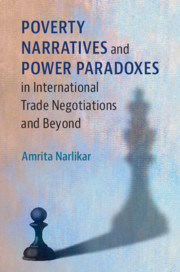Book contents
- Poverty Narratives and Power Paradoxes in International Trade Negotiations and Beyond
- Poverty Narratives and Power Paradoxes in International Trade Negotiations and Beyond
- Copyright page
- Dedication
- Contents
- Acknowledgements
- 1 Introduction
- 2 The Disempowered Many
- 3 Winning against the Odds
- 4 When Fair Is Foul and Foul Is Fair
- 5 Conclusion
- Index
- References
1 - Introduction
Poverty Narratives and Power Paradoxes
Published online by Cambridge University Press: 16 April 2020
- Poverty Narratives and Power Paradoxes in International Trade Negotiations and Beyond
- Poverty Narratives and Power Paradoxes in International Trade Negotiations and Beyond
- Copyright page
- Dedication
- Contents
- Acknowledgements
- 1 Introduction
- 2 The Disempowered Many
- 3 Winning against the Odds
- 4 When Fair Is Foul and Foul Is Fair
- 5 Conclusion
- Index
- References
Summary
Chapter 1 is the framing chapter. It identifies the central puzzle that drives this book. It provides an overview of the theoretical approach and methodology, as well as the book structure and chapter outline.
Keywords
- Type
- Chapter
- Information
- Publisher: Cambridge University PressPrint publication year: 2020

